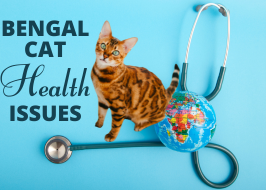Bengal Cat Health Issues: Common Problems and Solutions
Bengal cats can suffer from various health issues, including hypertrophic cardiomyopathy and progressive retinal atrophy. Regular vet check-ups are crucial.
Bengal cats are known for their striking appearance and playful nature. Their wild look and energetic personality make them popular pets. Despite their robust appearance, Bengal cats are prone to specific health problems. Owners should be aware of these issues to ensure proper care.
Common concerns include heart disease, eye conditions, and digestive problems. Regular veterinary visits help catch these problems early. A balanced diet and regular exercise also play a significant role in maintaining their health. Understanding these health issues is essential for any Bengal cat owner. Proper care can lead to a happy and healthy life for these beautiful cats.
Introduction To Bengal Cat Health
Bengal cats are known for their exotic looks and playful nature. Understanding their health issues is crucial for their well-being. This section provides insights into Bengal cat health.
Breed Overview
Bengal cats are a hybrid breed. They are a mix of domestic cats and Asian leopard cats. They have a wild appearance and a friendly temperament.
Here are some key characteristics:
- Distinctive coat patterns: Rosettes, spots, or marbling.
- Active and playful: They love to climb and explore.
- Intelligent: They can learn tricks and commands.
Why Health Matters
Health is crucial for Bengal cats’ quality of life. Understanding potential health issues helps in early detection and treatment.
Common health concerns include:
- Hypertrophic Cardiomyopathy (HCM): A heart disease that affects Bengal cats.
- Progressive Retinal Atrophy (PRA): A genetic eye condition leading to blindness.
- Hip Dysplasia: Joint issues that can affect mobility.
Regular vet check-ups are essential. These help in monitoring and maintaining their health.
Genetic Disorders
Bengal cats are known for their beauty and playful nature. But like all breeds, they have some health issues. One of the major concerns is genetic disorders. These disorders are inherited and can affect the cat’s quality of life. Understanding these disorders can help in early diagnosis and treatment. Below, we discuss two key genetic disorders in Bengal cats.
Hypertrophic Cardiomyopathy
Hypertrophic Cardiomyopathy (HCM) is a common heart disease in Bengal cats. This condition causes the heart muscle to thicken. As a result, the heart can’t pump blood effectively. Symptoms may include lethargy, difficulty breathing, and loss of appetite.
HCM can be diagnosed through various tests:
- Ultrasound
- ECG
- Chest X-ray
Early detection is crucial for managing HCM. Regular veterinary check-ups are essential. Medications may help control the symptoms and improve the cat’s quality of life.
Progressive Retinal Atrophy
Progressive Retinal Atrophy (PRA) affects a cat’s vision. This genetic disorder leads to the gradual degeneration of the retina. Over time, it can cause blindness.
Signs of PRA include:
- Night blindness
- Dilated pupils
- Bumping into objects
There is no cure for PRA. But early diagnosis can help in managing the condition. Ensuring a safe environment for your cat can prevent injuries. Genetic testing can identify carriers and help in breeding decisions.
| Disorder | Symptoms | Diagnosis | Treatment |
|---|---|---|---|
| Hypertrophic Cardiomyopathy | Lethargy, Difficulty Breathing, Loss of Appetite | Ultrasound, ECG, Chest X-ray | Medications, Regular Check-ups |
| Progressive Retinal Atrophy | Night Blindness, Dilated Pupils, Bumping into Objects | Genetic Testing | Manage Environment, No Cure |
Infectious Diseases
Bengal cats, like all felines, can be susceptible to infectious diseases. It is essential to be aware of these diseases to ensure the health and well-being of your Bengal cat. Below, we focus on two significant infectious diseases: Feline Leukemia Virus and Feline Infectious Peritonitis.
Feline Leukemia Virus
The Feline Leukemia Virus (FeLV) is a severe condition for Bengal cats. FeLV weakens the cat’s immune system, making them vulnerable to other infections. It spreads through saliva, blood, and sometimes urine or feces.
- FeLV affects blood production and can cause anemia.
- It increases the risk of other infections.
- Symptoms include lethargy, weight loss, and fever.
Regular vet visits and FeLV vaccinations can help prevent this disease.
Feline Infectious Peritonitis
Feline Infectious Peritonitis (FIP) is another critical disease for Bengal cats. It is caused by a mutation of the feline coronavirus. FIP is often fatal and affects the cat’s abdomen and chest.
- Common symptoms are fever, weight loss, and abdominal swelling.
- FIP can be wet (effusive) or dry (non-effusive).
- Wet FIP causes fluid accumulation in the abdomen or chest.
- Dry FIP causes organ failure and granulomas.
Early detection is crucial for managing FIP. Consult your vet immediately if you notice any symptoms.
Digestive Issues
Bengal cats are known for their exotic appearance and playful nature. Despite their robust demeanor, they can suffer from various digestive issues. Proper understanding can help in managing these problems effectively.
Diarrhea And Vomiting
Diarrhea and vomiting are common in Bengal cats. These symptoms can indicate underlying issues. They can range from mild to severe. Causes include infections, parasites, or dietary indiscretions. It’s crucial to monitor your Bengal cat closely.
- Ensure they are hydrated.
- Provide a bland diet temporarily.
- Consult a veterinarian if symptoms persist.
Regular vet check-ups can help catch issues early. Keep an eye on their stool consistency and frequency. Sudden changes might indicate a problem.
Food Allergies
Bengal cats can develop food allergies. These allergies can cause digestive issues. Symptoms include vomiting, diarrhea, and excessive scratching. Identifying the allergen is crucial.
| Common Allergens | Symptoms |
|---|---|
| Chicken | Vomiting, diarrhea |
| Grains | Skin irritation, digestive upset |
| Dairy | Gas, loose stools |
To manage food allergies, try an elimination diet. Gradually reintroduce foods to identify the allergen. Consult with your vet for guidance.
High-quality cat food can reduce the risk of allergies. Look for hypoallergenic options. Always read the ingredient list carefully.
Skin And Coat Problems
Bengal cats are known for their beautiful, sleek coats. Yet, they can face various skin and coat problems that affect their health. Understanding these issues can help keep your Bengal cat healthy and happy.
Flea Allergies
Flea allergies are common in Bengal cats. These allergies can cause intense itching and discomfort. Even a single flea bite can trigger a reaction.
Signs of flea allergies include:
- Excessive scratching
- Red, inflamed skin
- Hair loss
To manage flea allergies:
- Use vet-approved flea treatments.
- Maintain a clean living environment.
- Regularly check your cat for fleas.
Dermatitis
Dermatitis is another issue that Bengal cats can face. This condition involves skin inflammation and can be caused by various factors.
Common causes of dermatitis include:
- Allergies
- Infections
- Parasites
Symptoms of dermatitis are:
- Red, swollen skin
- Itching and scratching
- Dry, flaky patches
| Cause | Symptoms | Treatment |
|---|---|---|
| Allergies | Red, swollen skin | Identify and remove allergens |
| Infections | Dry, flaky patches | Use antibiotics or antifungals |
| Parasites | Itching and scratching | Use vet-approved treatments |
Regular vet visits can help diagnose and treat dermatitis early. Keeping your Bengal cat’s skin and coat healthy is vital. This ensures they live a comfortable life.
Dental Health
Dental health is crucial for Bengal cats. Poor dental health can lead to serious problems. Regular check-ups can prevent many issues. Let’s explore common dental problems in Bengal cats.
Tooth Decay
Tooth decay in Bengal cats is common. It happens when plaque builds up. Plaque contains bacteria that damage teeth. Regular brushing can reduce the risk.
Signs of tooth decay:
- Bad breath
- Yellow or brown teeth
- Difficulty eating
Visit the vet if you notice these signs. Early treatment is essential. Your vet may recommend a dental cleaning. Special cat toothpaste can also help.
Gum Disease
Gum disease, or gingivitis, is another issue. It starts with inflammation of the gums. If untreated, it can lead to periodontitis. This affects the bones and tissues supporting the teeth.
Symptoms of gum disease:
- Red, swollen gums
- Bleeding gums
- Pain when eating
Prevent gum disease with regular brushing. Dental treats can also help. Ensure your Bengal cat has a balanced diet. Regular vet visits are crucial.
Here’s a quick table for better understanding:
| Dental Issue | Signs | Prevention |
|---|---|---|
| Tooth Decay | Bad breath, yellow teeth, difficulty eating | Regular brushing, dental cleanings |
| Gum Disease | Red gums, bleeding, pain when eating | Brushing, dental treats, balanced diet |
Preventive Care
Preventive care is crucial for maintaining the health of your Bengal cat. Proper care helps avoid serious health issues and ensures a long, happy life. Here are essential aspects of preventive care:
Regular Vet Visits
Scheduling regular vet visits is vital. Your Bengal cat should see a vet at least once a year. During these visits, the vet will perform a thorough examination. This helps to detect any underlying health issues early.
Regular check-ups also allow for the monitoring of your cat’s weight, dental health, and overall condition. Early detection of problems can lead to more effective treatment. It is a good practice to make notes of any changes in behavior or health and discuss these with the vet.
Vaccinations
Vaccinations are essential to protect your Bengal cat from common diseases. Ensure your cat receives all recommended vaccinations. These include vaccines for feline distemper, feline herpesvirus, and calicivirus.
A typical vaccination schedule includes:
- 8 weeks: First vaccination
- 12 weeks: Booster shot
- 16 weeks: Final booster
- Annually: Yearly booster shots
Consult your vet for a tailored vaccination plan. This will depend on your Bengal cat’s age, health status, and lifestyle. Keeping up with vaccinations helps prevent serious diseases and ensures a healthier life for your cat.
Home Care Tips
Keeping a Bengal cat healthy involves more than just regular vet visits. Proper home care ensures they remain happy and active. Here are some essential tips for Bengal cat owners.
Diet And Nutrition
A balanced diet is crucial for a Bengal cat’s health. Feed your Bengal high-quality cat food. This ensures they get all the necessary nutrients.
| Food Type | Benefits |
|---|---|
| High-Protein Dry Food | Supports muscle growth and energy |
| Wet Food | Helps with hydration |
| Raw Diet | Mimics natural diet, promotes dental health |
Always provide fresh water. Hydration is essential for their kidney health.
Exercise And Mental Stimulation
Bengal cats are energetic and curious. Regular exercise keeps them fit. Mental stimulation prevents boredom.
- Interactive toys like feather wands
- Climbing trees or cat towers
- Puzzle feeders for mental challenge
Spend time playing with your Bengal daily. This strengthens your bond and keeps them engaged.
When To See A Vet
Keeping your Bengal cat healthy is crucial. Knowing when to see a vet can save your cat’s life. Regular check-ups and recognizing warning signs are key. This section will guide you on when to see a vet for your Bengal cat.
Warning Signs
Recognizing warning signs early can prevent serious health issues. Look for these symptoms:
- Change in appetite: Eating more or less than usual.
- Weight loss: Sudden or gradual weight loss.
- Lethargy: Unusual tiredness or lack of energy.
- Vomiting: Frequent or severe vomiting.
- Diarrhea: Persistent or severe diarrhea.
- Breathing difficulties: Labored or noisy breathing.
- Frequent urination: Increased trips to the litter box.
Emergency Situations
Some situations require immediate veterinary attention. These emergencies include:
- Difficulty breathing: Rapid or shallow breathing.
- Severe injury: Visible wounds or broken bones.
- Seizures: Uncontrolled shaking or convulsions.
- Unconsciousness: Not responding to stimuli.
- Severe allergic reactions: Swelling, hives, or difficulty breathing.
If you notice any of these signs, visit a vet immediately. Quick action can save your Bengal cat’s life.
Frequently Asked Questions
What Are Common Bengal Cat Health Issues?
Bengal cats often face heart disease, hip dysplasia, and dental issues. Regular vet visits help monitor and prevent problems.
How To Prevent Bengal Cat Health Problems?
Maintain a balanced diet, regular exercise, and frequent vet check-ups. Early detection is crucial for health management.
Are Bengal Cats Prone To Genetic Disorders?
Yes, Bengals can inherit genetic issues like progressive retinal atrophy and hypertrophic cardiomyopathy. Proper breeding practices can reduce risks.
What Are Symptoms Of Bengal Cat Allergies?
Bengals may show symptoms like sneezing, itching, and watery eyes. Consult a vet for accurate diagnosis and treatment.
How To Manage Bengal Cat Dental Health?
Brush their teeth regularly and provide dental treats. Annual vet dental checks help maintain oral health.
Do Bengal Cats Need Special Diets?
Yes, high-protein diets are recommended. Consult your vet for a diet plan tailored to your Bengal’s needs.
How Often Should Bengals See A Vet?
Bengal cats should have annual vet check-ups. Kittens and older cats may need more frequent visits.
What Vaccinations Do Bengal Cats Need?
Bengals need core vaccines like rabies, feline distemper, and respiratory viruses. Your vet will recommend a schedule.
How To Spot Bengal Cat Heart Disease?
Look for symptoms like lethargy, coughing, and difficulty breathing. Early vet intervention is essential.
Can Bengal Cats Get Hip Dysplasia?
Yes, Bengal cats can develop hip dysplasia. Symptoms include limping and difficulty jumping. Consult your vet for treatment options.
Conclusion
Ensuring your Bengal cat’s health requires vigilance and regular vet visits. Early detection of issues can prevent complications. Provide a balanced diet and plenty of exercise. Monitor for common health problems like heart disease and dental issues. With proper care, your Bengal cat can lead a healthy, happy life.





